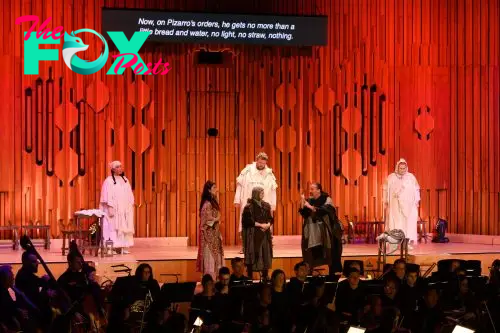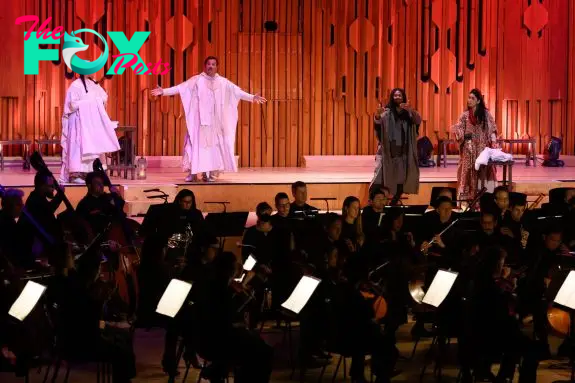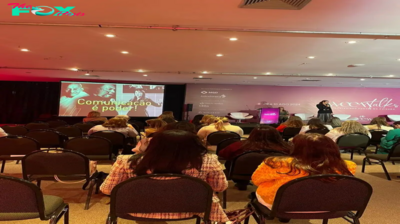Entertainment
Dudamel and the LA PhilŌĆÖs shifting and significant Fidelio ŌĆō Seen and Heard Worldwide
 United Kingdom Beethoven, Fidelio: Soloists, Deaf West Theatre (Los Angeles), Coro de Manos Blancas (White Arms Choir, Venezuela), Cor de Cambra del Palau de la M├║sica Catalana, Cor del Gran Teatre del Liceu, Los Angeles Philharmonic / Gustavo Dudamel (conductor). Barbican Corridor, London, 3.6.2024. (AK)
United Kingdom Beethoven, Fidelio: Soloists, Deaf West Theatre (Los Angeles), Coro de Manos Blancas (White Arms Choir, Venezuela), Cor de Cambra del Palau de la M├║sica Catalana, Cor del Gran Teatre del Liceu, Los Angeles Philharmonic / Gustavo Dudamel (conductor). Barbican Corridor, London, 3.6.2024. (AK)

Manufacturing:
Director ŌĆō┬ĀAlberto Alvero
Co-director ŌĆō Joaquin Solano
Creative producer┬ĀŌĆō┬ĀGabriela Camejo
Costume designer┬ĀŌĆō┬ĀSolange Mendoza
Lighting designers ŌĆō Tyler Glover and Tyler Lambert-Perkins
Signal language choreographer┬ĀŌĆō┬ĀColin Analco
Assistant language choreographer┬ĀŌĆō Bridget Berrigan
Solid:
Leonora┬ĀŌĆō┬ĀTamara Wilson (soprano), Amelia Hensley (actor)
Florestan┬ĀŌĆō┬ĀAndrew Staples (tenor), Daniel Durant (actor)
Rocco┬ĀŌĆō James Rutherford (bass-baritone), Hector Reynoso (actor)
Marzelline┬ĀŌĆō┬ĀGabriella Reyes (soprano), Sophia Morales (actor)
Jaquino┬ĀŌĆō┬ĀDavid Portillo (tenor), Otis Jones (actor)
Don Pizzaro┬ĀŌĆō┬ĀShenyang (bass-baritone), Giovanni Maucere (actor)
Don Fernando┬ĀŌĆō┬ĀPatrick Blackwell (bass-baritone), Mervin Primeaux-OŌĆÖBryant (actor)
Based in Venezuela in 1975 by Venezuelan educator, musician, and activist Jos├® Antonio Abreu, the El Sistema music program catered for deprived youth with the motto ŌĆśMusic for Social ChangeŌĆÖ.
Gustavo Dudamel, born right into a musician household in 1981, skilled the ability of music for integration when, on the age of 18, he was appointed Music Director of the Sim├│n Bol├Łvar Youth Symphony Orchestra, consisting of graduates of the El Sistema program.
The significance of social change and integration by music has entered DudamelŌĆÖs DNA; one of many manifestations is his revolutionary challenge of involving deaf individuals into the artwork of opera.
For this Barbican Corridor live performance, a collaboration between the Los Angeles Philharmonic, Deaf West Theatre (Los Angeles), El SistemaŌĆÖs Coro de Manos Blancas (White Arms Choir, Venezuela, for deaf and hard-hearing youngsters/adults) in addition to two choirs from Catalan and Liceu respectively created a deeply shifting and wholly absorbing staged presentation of Fidelio, composed by Beethoven by which period ŌĆō in line with our greatest data ŌĆō he was already deaf.
The rehearsal interval for the Barbican efficiency included integration not solely between listening to and deaf individuals but additionally between a number of spoken and signed languages.
Fidelio is in German, the taking part teams spoke/signed in English, American English (ASL: the signing of that is totally different from English signing), Venezuelan, Spanish and Catalan. On the most informative and interesting Barbican pre-concert speak, eight translators signed concurrently to verify everyoneŌĆÖs full integration. Nevertheless, on the precise efficiency the unified worldwide signal language was used.
The efficiency was aimed for each deaf and listening to audiences. This aspiration included supplying common operatic surtitles however with the addition of feedback comparable to ŌĆśmusical introŌĆÖ, ŌĆśmarchŌĆÖ and many others. when singing/signing stopped throughout purely orchestral passages. I’m not certain why such feedback had been vital: the viewers (deaf and listening to) may see when singers and deaf actors stopped singing/signing and when individuals on the stage had been marching. Nevertheless, feedback like ŌĆśknockingŌĆÖ when indicated solely by orchestral music had been wholly justified.

With skilful association, Barbican CorridorŌĆÖs stage can accommodate operatic performances though ŌĆō with the orchestra in full sight ŌĆō the outline ŌĆśsemi-stagedŌĆÖ could also be extra acceptable. To facilitate house for the singers/actors, on this event the orchestra appears to have used barely decreased strings from its common symphony dimension. Nevertheless, as talked about on the pre-concert speak, throughout some intervals of the efficiency 200 individuals had been on stage.
At any given time, singers ŌĆō whether or not soloists or the choir ŌĆō had their deaf counterpart actors with them on stage. The distribution of house between the singer/actor pairs diverse from scene to scene. Typically they stood subsequent to one another, different instances at totally different components of the stage: there was fluidity in spacing, all the time in keeping with music and textual content.
The signed interpretation took be aware of musical tempi/sounds/phrases. It appears to me that both the deaf actors memorised the rhythm of the BeethovenŌĆÖs rating or they adopted the conductor. For certain, long-held musical notes had been represented by long-held physique pauses, quick music was additionally interpreted by corresponding physique actions by the extremely expert deaf actors. Signing was extra than simply translating the sung textual content: there was choreography of feelings, largely fantastically expressed. My visitor commented that the physique language of deaf actors reminded him of silent movies. It so occurs that on the pre-concert speak ŌĆō which my visitor didn’t attend ŌĆō Adorno was quoted as saying that opera is the movie of the nineteenth century. Certainly, we had been again within the nineteenth century, that’s in BeethovenŌĆÖs time, in additional methods than one.
Recitatives/dialogues within the rating had been both lower or had been carried out in silence by the signing actors. Silence thus grew to become an integral a part of the opera, because it grew to become integral in BeethovenŌĆÖs life. By and huge, solo singers didn’t act, largely (though not all the time) stood and delivered their arias because it was the customized of older instances. Nevertheless, at particular moments, singing/signing pairs touchingly communicated with one another, even hugged (just like the Leonora and Florestan pairs respectively).
The solo singers wore white robes, their signing counterparts wore varied different colors. This color distinction was additionally manifested within the costumes of the assorted choirs (deaf or listening to). The prisonersŌĆÖ choir included ladies too (though I can not keep in mind in the event that they had been signing actors or feminine voices who had been added to BeethovenŌĆÖs tenor and bass prisoner choir).
My focus was not on the musical facet, I used to be considerably mesmerised by the staging. Nevertheless, most likely I’d have seen if something was incorrect musically. And I did discover that the ever-reliable tenor Andrew Staples introduced in FlorestanŌĆÖs excessive G be aware on his first entrance with whole safety, as if it was simply regular to be cooped up on stage for a substantial time and begin singing with such a excessive and long-held be aware (Act II, Scene 1). In my former life as a cellist in an opera home I heard many tenors fall sufferer to this be aware.
I additionally famous the tremendous professionalism of the Los Angeles Philharmonic, their rock-solid trumPet participant (presumably Thomas Hooten) heralding the arrival of Don Fernando, first off stage then in full view on stage. No issues with any of the 2 singing choirs both, whereas the White Arms Choir was astonishing with their mild aspect to aspect actions in good time with the music.
DudamelŌĆÖs tempi felt good, the quartet ŌĆśMir ist so wunderbarŌĆÖ (Act I, Scene 4) was as mild as stunning. I additionally suppose, though I may need not seen it appropriately, that Dudamel carried out the entire opera from reminiscence, with admirable full management of all singers, all actors, all choruses.
This staging may need represented a brand new kind that’s ŌĆśdeaf operaŌĆÖ however I (with full listening to) have by no means skilled such a shifting and significant presentation of Fidelio: full integration was achieved and sweetness dominated supreme.
Agnes Kory
-

 Entertainment3h ago
Entertainment3h agoA Look at the Dating History and Rumoured Relationships of BIGBANG Star G-Dragon
-

 Entertainment10h ago
Entertainment10h agoMike and Lauren Sorrentino Introduce Baby No. 3 to Kids in ŌĆśJersey ShoreŌĆÖ Exclusive Clip
-

 Entertainment14h ago
Entertainment14h agoNatasha Rothwell on Her Memorable Firsts
-

 Entertainment19h ago
Entertainment19h agoFace Me and Other Korean Medical Crime Shows That are Must Watch
-

 Entertainment1d ago
Entertainment1d agoClassic Korean Movies Like Piagol to Add to Your Watch List
-

 Entertainment1d ago
Entertainment1d agoOver 60 Million People Tuned in to Watch Jake Paul┬Āvs. Mike Tyson
-

 Entertainment1d ago
Entertainment1d agoPopular Hudson Valley Italian Restaurant Addresses Closing Rumors
-

 Entertainment1d ago
Entertainment1d agoRHOBHŌĆÖs Dorit Kemsley Addresses Viral Smoking Scene on Season 14 Premiere: ŌĆśI Was Being ChasedŌĆÖ



















